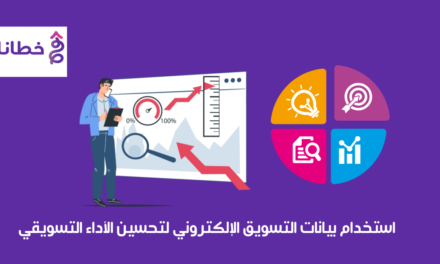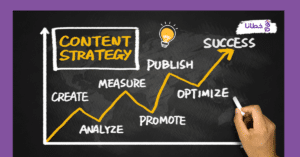table of contents
In a world dominated by data, big data stands out as one of the most important assets marketers can leverage to improve their strategies and enhance their marketing decisions. With the ever-increasing volume of available data, it has become imperative to adopt advanced analytical methods to extract true value from this data and leverage it to craft more effective and personalized marketing campaigns.
The importance of big data in e-marketing
Its ability to provide accurate insights into customer behavior and preferences enables marketers to precisely identify target audiences and design marketing messages tailored to their needs and desires. By analyzing big data, companies can optimize supply chains, strengthen marketing campaigns, and gain a better understanding of their audiences.
How to Use Big Data in Digital Marketing
To make the most of big data, marketers must take an integrated approach that includes data collection, analysis, and application. This begins with identifying relevant data that can provide insights about customers and the market. This data is then analyzed using advanced analytics tools to discover patterns and trends. Finally, these insights are applied to develop targeted and personalized marketing strategies. Big Data Analysis and Importance: Big data analysis is a key component of our current era, due to its significant importance in extracting valuable insights and information from vast amounts of data. Here are some key points about big data analysis and its importance:
- Decision Making: Big data analysis helps businesses and organizations make faster and more effective decisions, leading to improved operations and increased profitability.
- Big data analytics: refers to the use of advanced analytical techniques to understand large and diverse sets of data, which include both structured and unstructured data.
- Evolution and Innovation: The future promises further advancements in the field of big data analytics, opening new horizons for innovation and progress across various sectors.
- Insights and trends: By analyzing big data, analysts can uncover market trends, consumer preferences, and hidden data patterns.
- Challenges: Big data analysis faces challenges related to data volume, collection speed, diversity, and privacy.
Big data analysis is a fundamental pillar of progress in computer science, technical engineering, and software engineering, and is increasingly taught in academic universities. Read more: Marketing Data Analysis.
Challenges Facing Big Data Analysis
Big data analysis in e-marketing faces several major challenges, including:
- Data volume and variety: Data comes from multiple and diverse sources, such as text, images, audio, video, and social media, making it difficult to collect, store, manage, integrate, and analyze effectively.
- Data validity and reliability: Qualitative data can be affected by factors such as context, source, method, bias, noise, and data quality, which impact the reliability of the data and the insights derived from it.
- Applying statistical and machine learning methods: Using statistical and machine learning methods for predictive analytics requires specialized expertise and knowledge to ensure accurate results.
- Preprocessing and cleaning techniques: Before data is analyzed, it must be cleaned and prepared, which requires advanced methods for handling complex and large data.
- Visualize and communicate results: Transforming data into actionable insights requires skills in visualizing data and communicating results in a way that is easily understood.
To overcome these challenges, marketers can use advanced data analysis tools and techniques, develop their big data skills, and collaborate with data experts to extract valuable insights that can help make smarter marketing decisions.
Big data applications in daily life
Its applications in daily life are diverse and numerous, and include areas such as:
- Banks and securities: Big data is used to monitor financial market activity and detect illegal trading.
- Healthcare: Helps improve medical services and scientific research by analyzing big health data.
- Education: Analyzing student data to improve the educational process and develop teaching methods.
- Manufacturing and Natural Resources: Improving the supply chain and developing new products.
- Insurance industry: Analyzing data to assess risk and determine policy pricing.
- Retail and Wholesale: Understanding customer behavior and improving the shopping experience.
- Government: Improving public services and enhancing transparency and efficiency in administration.
- Energy and Utilities: Improving energy efficiency and resource management.
- Transportation Industry: Improving Logistics and Fleet Management.
These are some examples of how big data is being used to improve daily life and make smarter decisions across various sectors.
Examples of successes using big data
There are many examples of successful use of big data in various sectors. Here are some notable examples:
- Better understanding of customer needs: Customer engagement data across social media platforms and website visits is analyzed to gain a deeper understanding of customer needs, improve the company’s standing with existing customers, and attract new ones.
- Learn more about competitors: Companies use big data to study competitors and analyze their pricing models and product categories, helping them formulate more effective competitive strategies.
- Personalizing marketing to smaller groups: Big data is used to segment your customer base into specific categories and interests and target marketing campaigns specifically designed for them, increasing marketing effectiveness.
- Identifying new trends in the field: Big data analysis enables companies to quickly monitor and respond to new trends, fostering innovation and maintaining market leadership.
- Risk and Crisis Management: Big data helps companies anticipate potential risks and develop strategies to effectively handle crises without harming the company.
- Improving human resource management: Companies are leveraging big data to improve recruitment, training, and performance evaluation processes, contributing to building a more efficient workforce.
These examples demonstrate how big data can transform businesses and contribute to tangible successes by improving decisions and operations.
Security and Privacy in Big Data
Security and privacy in big data are among the most important issues facing businesses and organizations in the digital age. Here are some key points on the topic:
- Data Security Pillars: It is essential to implement a set of security measures such as access control, data encryption, data masking, intrusion detection and prevention systems (IDPS), data classification, and regular auditing and monitoring.
- Federated Learning Solutions: Federated learning is an innovative solution for data protection, where sensitive data remains local and under the control of the data owner, and is not shared externally.
- The importance of privacy: In the age of digital data, personal data has become more digitized and interconnected, and it is essential to protect it to preserve individuals’ privacy.
- Legislation and regulations: An approach that includes technical and regulatory solutions to protect privacy must be adopted, and this requires cooperation between the government, civil society, and companies.
- Security Challenges: With the increasing amount and ease of access to data, companies face significant challenges in protecting this data from breaches and leaks.
These points highlight the critical importance of security and privacy in the field of big data and the ongoing efforts to improve them. It’s worth noting that there are companies specializing in this field that offer services like Khutana, a digital marketing and search engine optimization company that will help you develop well-thought-out and effective strategies to successfully achieve your marketing goals. You can contact us and request marketing consultations from a select group of distinguished professionals and experts in the field of digital marketing and search engine optimization.
The impact of big data on decision making
Big data plays a crucial role in improving decision-making across various sectors. Here are some key points about its impact:
- Identifying trends and patterns: Using big data analytics techniques, it is possible to identify actual trends and patterns in consumer behavior and anticipate their future needs.
- Responding to Change: Big Data helps companies be more flexible and quick to respond to market changes and identify new business opportunities.
- Reduce bias: Big data analytics reduces human bias in decision-making, leading to strategies that are more realistic and consistent with company goals.
- Improved accuracy: Big data analysis provides accurate information that helps make decisions based on real data rather than intuition or personal experience.
- Increase profits and reduce costs: Companies that use big data analytics to make decisions achieve increased profits and reduced costs.
- Valuable Insights: Decision makers can gain valuable insights from big data that help drive businesses and organizations forward and achieve their goals.
These points illustrate how big data has become an essential element in enhancing the efficiency and effectiveness of decision-making within organizations. Read more about: A Beginner’s Guide to Digital Marketing.
In conclusion, big data has radically changed the concept of marketing. It’s not just numbers and statistics; it’s the foundation upon which marketers build their strategies to reach their target audiences accurately and effectively. In short, big data is the fuel that drives digital marketing forward and the tool that enables marketers to deliver personalized and impactful customer experiences. As big data technologies continue to evolve, we expect to see even greater improvements in the way businesses engage with their customers and achieve their marketing goals. We’d love to share your opinions and questions in the comments section of this article.
Big Data in Digital Marketing: Driving Smarter Decisions 2025 Article Questions
Why is big data important for marketing?
Why is big data important in marketing? Big data has become an essential tool in marketing. Data constantly informs marketing teams about customer behavior and industry trends and is used to improve future efforts, create innovative campaigns, and build lasting customer relationships.
How is data used in digital marketing?
Data analytics allows marketers to track and measure the performance of their marketing campaigns in real-time. By analyzing campaign data such as click-through rates, conversion rates, and engagement rates, marketers can identify which campaigns are performing well and which need improvement.
How does big data impact marketing?
Big data is the primary driver of modern marketing. Every online purchase and interaction play a role in a complex and vast system. This vast landscape of data generates valuable insights for consumers and can even predict how customers or clients will behave in the future.
How to measure analytics?
Measuring analytics success requires a comprehensive approach. Align your metrics with business objectives, avoid pseudometrics, and use gradual rollouts to more accurately assess impact. For platforms, focus on user adoption, satisfaction, and retention.
We respect and value your time... half an hour to grow your project
































